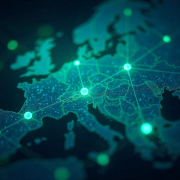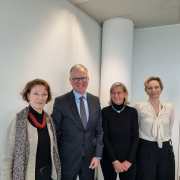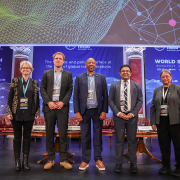A 3-part workshop series focused on developing tools to depolarise conversations on sustainable food systems comes to an end.
Between October and December 2024, ALLEA, in partnership with Re-Imagine Europa, organised a 3-part online workshop series, titled, Decoding Polarisation in Debates on Sustainable Food Systems. The invite-only event included diverse stakeholders, such as farmers, academics, activists, and policymakers, who came together to dive deep into the question, “How can we have more constructive conversations on sustainable food systems in Europe that lead to mutually-beneficial and innovative solutions?”
The hands-on and interactive workshops built on each other as they explored the “who”, “what”, “where”, and “why” of the current state of polarisation, and finally the “how” of depolarising these critical conversations to arrive at innovative solutions for an inclusive and equitable future.
Workshop 1
Actors and Agendas – Analysing “Who” are the Players in Sustainable Food Systems and “What” are their Interests
In the first workshop, participants mapped the different stakeholders in European food systems and discussed the different interests and agendas of these stakeholders, as well as their varying ideas of what “sustainability” means, in order to find common ground as well as their legitimate divergences. The first speaker, Barbara Gallani, Head of the European Food Safety Authority’s (EFSA) Communication and Partnerships (ENGAGE) Department, presented work that EFSA had done on stakeholder mapping and identified discourses on food using social media data. She noted that by collecting such data on the prevailing narratives and discourses, communication efforts on controversial topics could be improved. The second speaker, Sir Charles Godfray, Director, Oxford Martin School, began his presentation by asking the slightly provocative question, “Is agreement on land-use policy in the UK and Europe achievable?” The participants were asked to debate whether, and how, agricultural intensification can coexist with conservation and biodiversity preservation efforts. In addition to the speaker presentations, participants debated the complexities of trying to build consensus among the diversity of stakeholders in European food systems, without squashing dissent and or legitimate disagreement on goals, values, and methods.
Workshop 2
Roots of Polarisation – Revealing the “Why”
After the workshop on identifying the actors, participants were tasked with discovering the ‘roots’, i.e., the underlying social and contextual drivers, of the current state of polarisation on sustainable food systems. The session included presentations by Prof Bobby Duffy, Director of the Policy Institute at King’s College London, and Mario Scharfbillig, Science for Policy Analyst at the European Commission’s Joint Research Centre (JRC). Prof Duffy presented insights into the varying polarisation models , both affective and issue-based, in the literature and invited participants to analyse which might apply to the debates on food systems in Europe. Participants also looked into how issues on sustainable food are increasingly being looked at through a ‘culture war’ lens and discussed how this could be mitigated. Mario Scharfbillig then presented the latest research from the JRC on ‘Trustworthy Public Communication’, inviting participants to think about how to enable a paradigm shift – from influencing to empowering public debates on “contentious” topics. With a disclaimer that more effective communication is not the only tool to combat polarisation, Scharfbillig shared the report’s recommendations on how to talk to the public in a way that builds, and retains, trust.
Workshop 3
Depolarisation Tools and Solutions – Discovering “How” to Have Constructive Conversations on Sustainable Food Systems
In the final workshop, participants were tasked with discussing and developing depolarisation tools and methodologies. The session included presentations by Prof Stephan Lewandowsky, Professor of Cognitive Science, University of Bristol and Prof Bram Büscher, Professor and Chair at the Sociology of Development and Change group, Wageningen University. Prof Lewandowsky, who was previously a part of ALLEA’s PERITIA project on building trust in expertise, shared his research into combatting mis- and disinformation, particularly through the use of ‘inoculation’ science, along with real-life examples of such methodologies at work. Prof Büscher then shared his insights into the power structures that underpin polarisation with a look at conservation and environmentalism in the era of post-truth politics and platform Capitalism. He stressed that there was a pressing need to build alternative networks to the hegemony of the digital space, which could be harnessed for goals such as environmental and food sustainability. Participants then debated if/how inoculation methods could be applied to controversial topics in sustainable food systems, such as new genomic techniques (NGTs), and further discussed how to build alternative networks dedicated to making food more sustainable.
A more detailed report with key insights from the workshop series will be published in Spring 2025.











